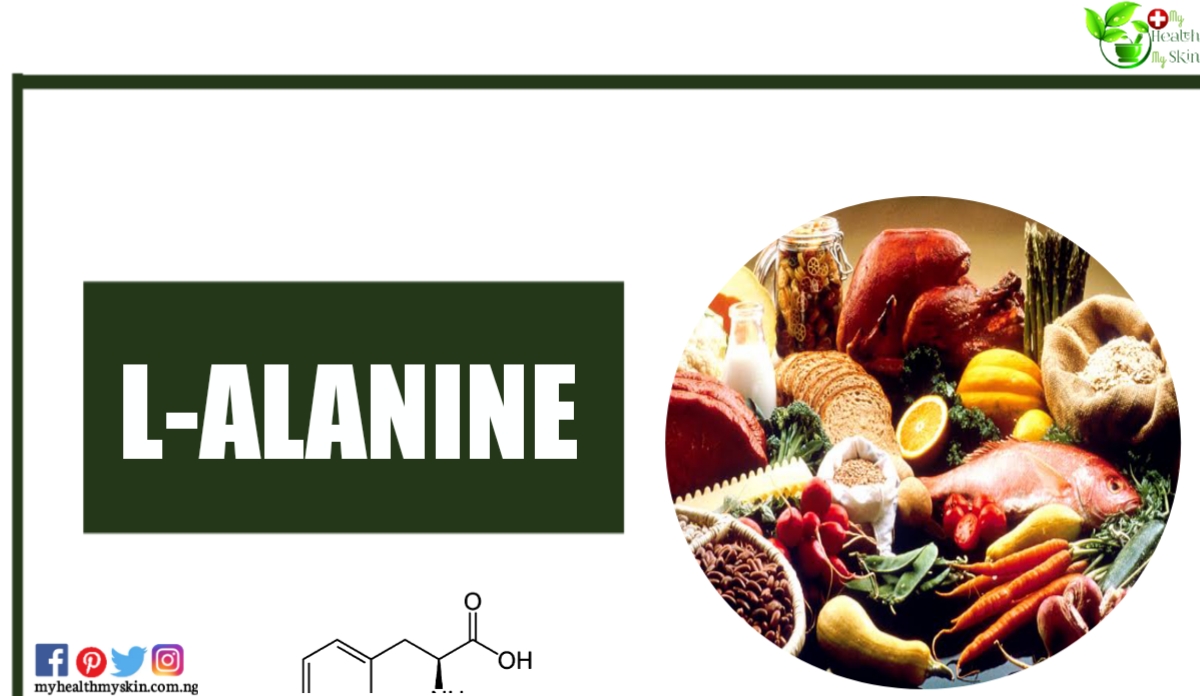L-alanine is one of the predominant amino acids in the human body, representing the primary structure of many proteins. It is important for converting glucose into energy, removing excess toxins from the liver, helping with prostate problems, kidney stones, and supporting the production of the hormone glucagon to increase blood sugar levels.
Its use is very popular in sports, as it helps the growth of muscle mass, supporting the body’s protein biosynthesis process.
We will better understand what L-alanine is, what it is for, what are its most important effects on the body and foods rich in the substance, in addition to analyzing supplementation and possible side effects.
[lwptoc]
L-Alanine – What is it?
L-alanine is a non-essential amino acid, which means the body can synthesize it internally. Therefore, it is not necessary to obtain it through the diet. It is considered one of the most prevalent amino acids in the human body, representing almost 8% of the primary structure of many proteins.
L-alanine helps the body convert simple glucose into energy and eliminate excess toxins from the liver. In addition, it helps to build strong and healthy muscles and protects cells during intense exercise.
L-alanine is critical to supporting the body’s nitrogen and glucose balance, a process called the alanine cycle. This process consists of transferring excess amino acids from cells or tissues to a receptor molecule produced by the breakdown of glucose.
It is then synthesized and directed to the liver, which extracts the nitrogen and returns it to the body to produce more glucose. Any excess nitrogen is turned into urea and expelled from the body in the urine. It also plays a role in the production of glucose, helping to control blood sugar and is commonly called “alanine” or “alpha-alanine”.
What Is It For?
- It serves to promote muscle growth, so it is widely used as a supplement in the sports world.
- Helps support the immune system.
- Contributes to kidney health.
- It helps keep the prostate healthy and treat disorders.
- It reduces diabetes complications due to its rapid release of glucose into the blood.
Effects On The Body
L-alanine performs important functions in the body. It serves to help muscle growth by supporting the body’s protein biosynthesis process. When this process happens, it is absorbed by the liver and converted to provide energy quickly and effectively, which is why it is used externally by athletes and bodybuilders to increase strength and enhance training.
Another advantage is that L-alanine helps protect muscle cells, decreasing the damage caused by intense exercise and preventing muscle catabolism, due to the intelligent utilization of glucose. Finally, it also helps to transfer nitrogen from the tissues to the liver, helping with detoxification and organ regeneration.
L-alanine is also often used in orthomolecular medicine because of its ability to support the immune system and help prevent kidney stones. In this way, it can be used to prevent the condition for those who are predisposed to the problem.
Another important result of L-alanine’s performance is its stimulation of the production of the hormone glucagon, when it identifies low blood sugar levels. For this reason, it is often used in cases of hypoglycemia, as it provides an energy spike, stimulating the immediate release of glucose into the bloodstream, preventing the body from suffering from low blood sugar levels or insulin shocks.
It also serves to help treat benign prostatic hyperplasia, better known as an enlarged prostate. A study carried out has shown that prostate fluid has a high concentration of L-alanine, therefore, it can protect the prostate itself from irregular enlargement.
Enlarged prostate often causes discomfort and difficulty urinating due to severe pain during urination. Faced with this situation, it helps to reduce swelling, reducing the symptoms and discomfort caused by the change.
In addition, it also serves to prevent or treat urea disorders, diabetes, glycogen storage disease, stress, dehydration from diarrhea, fatigue and liver disease. It innately reduces inflammation and helps balance and maintain the body’s overall functioning.
Foods That Contain L-Alanine
Foods with large amounts of L-Alanine should not be cooked or marinated for a long time, as this amino acid is hydrophilic, meaning it is water-soluble.
The richest sources of L-Alanine are animal proteins. Beef and fish are usually more recommended due to their high concentration, capable of helping to complete the daily needs of each person.
As it is widely used in the sports environment due to its support for building muscle mass, it is also ingested in the form of a powder supplement or capsules. Its use is usually done after training in order to make protein available for the body to repair damage caused by exercise and produce muscle. It is worth emphasizing that the supplement does not prevent the consumption of food rich in L-Alanine and other amino acids.
The best foods to increase L-Alanine are derived from lean cuts of meat, dairy products, high in protein, and green leafy vegetables.
- Milk and dairy products such as curd, yogurt and cheese;
- Eggs;
- Beef, pork, poultry and fish;
- Cress;
- Soy;
- asparagus;
- Bean;
- Spinach;
- Lentils
- Cauliflower;
- Pumpkin, sunflower and watermelon seeds;
- Beans;
- Corn;
- green pea;
- avocados;
- Sprouts in general;
- Nuts.
Supplementation
Although it is an amino acid produced by the body, it can become essential if for some reason the body stops producing it. This can happen to people who don’t eat properly, or who have an eating disorder, liver disease, diabetes, and urea cycle disorder. Cases like this may need supplementation:
- Hypoglycemia: Research has shown that taking the L-alanine supplement can help raise blood sugar levels after an episode of hypoglycemia, or excessive insulin intake. It can also keep your blood sugar from dropping too low overnight.
- Diarrhea-related dehydration. Studies carried out to date have not been conclusive regarding the effects for this case, but there is some evidence that L-Alanine can help in the treatment of dehydration caused by diarrhea.
- Glycogen storage disease. Results indicate that L-alanine may improve some symptoms, but not all.
Other diseases like liver disease, enlarged prostate, fatigue, stress, urea cycle disorders and other conditions can also be treated with L-alanine supplementation, but more studies are needed.
Dosage
The dose may vary depending on the formula. The powder and liquid versions are usually more potent than capsules, but it’s not a rule.
Dosing should be done according to the manufacturer’s recommendation. If you experience any side effects, its use should be discontinued immediately.
When the purpose of use is to enhance bodybuilding, it should be ingested before exercise. The powder is usually mixed with water or another liquid supplement, which makes an amino acid available almost immediately, enhancing the supplement’s benefits for exercise and bodybuilding.
L-alanine Side Effects And Safety
The use of L-alanine supplements has been shown to be safe when used properly for a short period of time. However, too much can raise blood sugar levels and trigger chronic fatigue syndrome. It can also disrupt the alanine cycle and eliminate glucose regulation, causing a lack of energy.
Special Precautions And Warnings
- Pregnancy and breast-feeding: There is no evidence and studies on the impacts of using L-alanine supplements during pregnancy and breast-feeding; therefore, before using, talk to your doctor to understand the possible effects of the supplement for pregnancy.
- Diabetes : L-alanine may be helpful in raising blood sugar levels in people with diabetes, but it can only be used in specific cases when blood sugar levels are low. If sugar levels are normal, it can be harmful.
L-alanine is marketed as a supplement and not a drug. Therefore, possible claims made by the manufacturers have not been evaluated and any recommendations regarding the efficacy and safety of this product have not been made.
To see more post on Physical & Mental Health click here.

Have You Tried L-alanine Supplementation? Was It Prescribed By A Professional For A Specific Condition Or Just For Muscle Growth? Comment Below!






